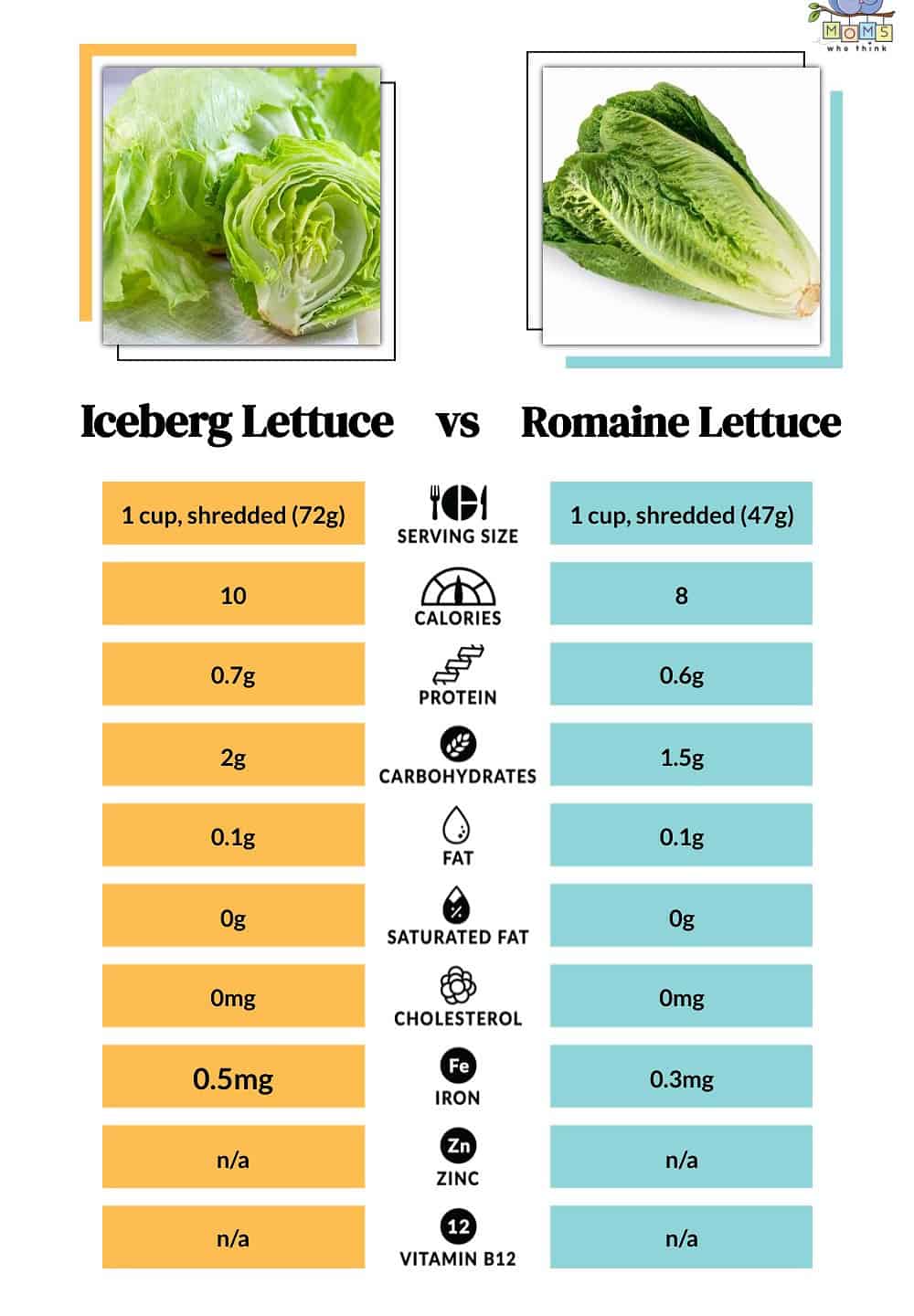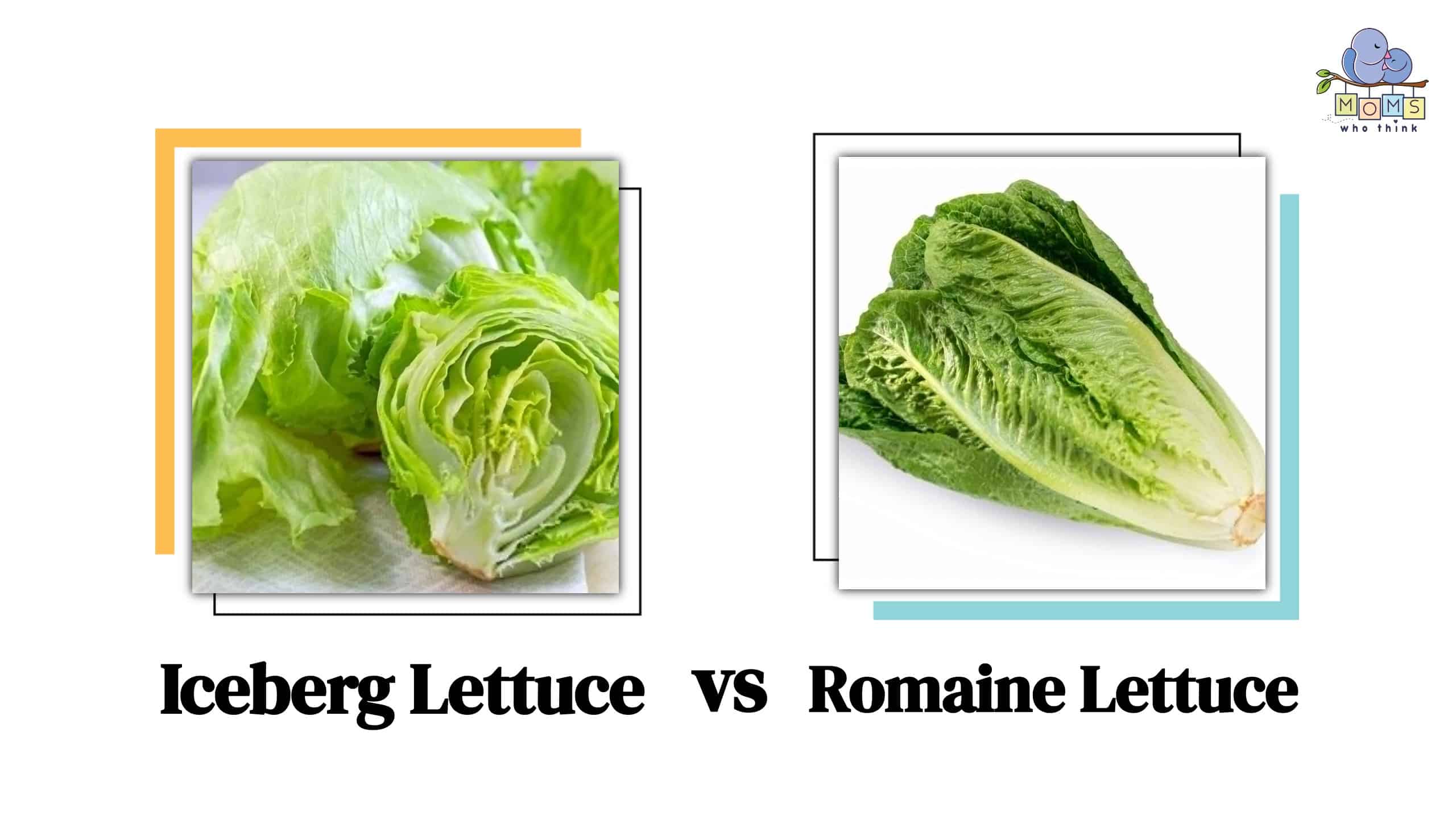Despite what you may think, not all forms of lettuce are created equal, especially when it comes to iceberg lettuce and romaine. Some of the differences between the two are that, though both are healthy, iceberg lettuce is slightly richer in vitamins. Romaine has a bit more of a robust flavor than iceberg lettuce. Here’s everything you need to know about the debate of iceberg lettuce vs. romaine.
Iceberg Lettuce vs. Romaine: What are the Differences?

©sophiecat/Shutterstock.com
Although both of these products appear similar at first glance, and you may even think they’re one in the same, there are several differences in the argument of iceberg lettuce vs. romaine.
Flavor Profile
Iceberg lettuce is a favorite due to its mild flavor with subtle hints of sweetness. It won’t have the strongest taste in the world, but it does its job. A sniff of iceberg lettuce will give you a grassy scent, and it’s the subtle aroma that helps it to pair well with many different elements. It’s the quintessential lettuce, and it makes the ingredient great for salads, wraps, and sandwiches.
On the other hand, romaine has a more robust flavor and even a more bitter taste that makes it feel utterly different from other forms of lettuce. With that said it’s still delicious. The leaves are also a bit more sturdy than iceberg lettuce, so you get that satisfying crunch. Romaine has that slightly bitter taste that pairs so well with the other elements on a plate. Plus, it has a fresh and earthy aroma, which makes the dish it's on very attractive. You can enhance the flavor with an acidic dressing.
- The must-have convenient reference guide for every home cook!
- Includes more than 8,000 substitutions for ingredients, cookware, and techniques.
- Save time and money on by avoiding trips to grab that "missing" ingredient you don't really need.
Best Uses
One of the similarities in the iceberg lettuce vs. romaine debate is how both are used in meals. Many chefs reach for the romaine when cooking their masterpieces because it has the darker, nutrient-rich dishes that really make a dish stand out. Plus, its sturdier leaves hold up well against hardy ingredients.
Many Cesar salads are made with romaine because of the color the leaves add and the way that the leaves complement the taste of the tangy dressing. Romaine is also used a lot on sandwiches and on wraps because of that great crunch. Romaine even tastes good by itself, especially when you add a bit of balsamic dressing. The leaves are so sturdy that many people use them as cups for small appetizers at parties.
Iceberg lettuce also does well in meals that require sturdy leaves, and it’s a great low-carb option when making wraps. Iceberg is typically the lettuce that you’ll see on American hamburgers and sandwiches. It’s also a great accent to tacos when shredded. Iceberg lettuce is also a no-brainer for salads.
Care and Storage
The storage and hygiene of both iceberg lettuce and romaine are a bit different. To properly store iceberg lettuce for maximum longevity, it’s best to remove the wilted outer leaves and then wrap what remains of the head in a paper towel. Then, put it in a plastic bag and place it in the crisper of the refrigerator.
Romain seems to hold better and for longer. You can either store the whole head in the fridge or store the separated leaves. If you store just the leaves, then wash and pat them dry and put them in the plastic bag, but keep the bag open a bit to allow some airflow. Both romaine and iceberg lettuce will last about 7-10 days in the refrigerator.
Both foods should be properly washed before they’re consumed. Remove dirty outer leaves and then run the rest of the head underwater as you pat it to remove any remaining dirt. For extra precaution, wash them in a mild mix of water and vinegar.
Origins
In the debate of iceberg lettuce vs. romaine, you’ll see a long origin story for both. Iceberg lettuce has origins that go back to ancient Egypt. They used to grow lettuce on the sides of the Nile River. From there, the lettuce made its way to Rome and finally in the 19th century. Back then, it was called “curled leaf lettuce,” but it got the name “iceberg” due to the fact that it was shipped in ice. The name stuck with Americans because they also used ice to keep the lettuce cold at home.
Romaine also goes back to ancient times, when it was first cultivated in the Middle East. The name “Romaine” comes from the Romans who loved the vegetable and used it often. Later, Romaine spread across Europe and to America. It continues to be used in dishes around the world.
Iceberg Lettuce vs. Romaine: Nutritional Value
When you compare a cup of iceberg lettuce vs. romaine, you’ll find that both are pretty similar when it comes to nutritional value. However, if you’re trying to cut calories and carbs in your diet, then romaine lettuce may be the way to go.
Romain technically has fewer calories than iceberg lettuce and fewer carbohydrates. So if you’re really a stickler for those things, then stick with the Romain. It’s worth noting that iceberg lettuce has a slightly higher protein, so if you plan to be healthy and gain muscle, then go in that direction. Still, you could eat either iceberg or romaine every day, and you won’t gain a lot of weight because they’re both healthy.
Health Chart
You can see a full breakdown of all the nutrients and components of both foods in the chart below:
- The must-have convenient reference guide for every home cook!
- Includes more than 8,000 substitutions for ingredients, cookware, and techniques.
- Save time and money on by avoiding trips to grab that "missing" ingredient you don't really need.

Vitamins not mentioned on that list include vitamins A, C, and K.
Vitamin A is helpful for the healthy growth of development of your body and your immune system. It’s also one of the components of eye health. Getting enough of it can help you to avoid cataracts as you get older.
Then there’s vitamin C, which protects the cells in your body and aids in the building of blood vessels and the collagen in your bones. It’s worth noting that your body does not produce vitamin C on its own. So you need to get it from your food sources, and either iceberg lettuce or romaine can provide a portion of what you need. You can also get vitamin C from broccoli, spinach, and Brussels sprouts, all of which are commonly combined with lettuce in salads.
Vitamin K is also necessary for your health and development. It helps in the production of your blood and the building of your bones. Vitamin K also helps to aid the blood clotting that is necessary when you are injured so you don’t bleed excessively. This vitamin is mostly found in leafy greens and soybeans, so the more lettuce you eat, the better.
What are Substitutes for Iceberg Lettuce or Romaine?
Many people like to add texture to their meals with some type of leafy green. However, they aren’t so thrilled about either iceberg lettuce or romaine. If that is the case for you, then there are many similar alternatives to consider, including:
- Kale – Kale offers a similar crunch, and it’s high in fiber and essential vitamins.
- Chard – It’s tasty, and it’s good for eye health, and improves blood flow.
- Spinach – Provides a slightly different texture, but it’s very healthy and goes great in many recipes.
- Arugula – It’s a great topping for pizza, and it has the vitamins to boost your immune system.
- Collard Greens – Many families prefer collard greens due to their taste and texture.
Conclusion

- Iceberg lettuce's mild, sweet flavor makes it a great addition to sandwiches and wraps. Romaine lettuce's strong, robust flavor makes it a powerful center point of salads.
- Since romaine has sturdier leaves, it is often preferred by chefs.
- Romaine's darker colors are also preferred by chefs, since it stands out more in a dish. The lighter greens of iceberg blend into a dish more easily.
These are the main differences between iceberg lettuce vs. romaine. Both are healthy ingredients in your salads and sandwich, and they both have that satisfying crunch. However, they do have some differences, so consider them during your next meal.
If you're looking to enjoy these lettuce varieties, try this Cobb salad:
PrintCobb salad
Ingredients
- 1/2 head iceberg lettuce
- 1/2 bunch watercress
- 1 small bunch of curly endive
- 1/2 head romaine lettuce
- 2 Tablespoons chives, minced
- 2 medium tomatoes, peeled, seeded, diced
- 1 whole boneless skinless chicken breast, cooked and diced
- 6 bacon slices, cooked and diced
- 1 avocado, peeled and diced
- 3 hard-boiled eggs, diced
- 1/2 cup Roquefort cheese, crumbled
French Dressing Ingredients:
- 1/4 cup water
- 1/4 cup red wine vinegar
- 1/4 teaspoon sugar
- 1 1/2 teaspoons lemon juice
- 1/2 teaspoon salt
- 1/2 teaspoon black pepper
- 1/2 teaspoon Worcestershire sauce
- 3/4 teaspoon dry mustard
- 1/2 garlic clove, minced
- 1/4 cup olive oil
- 3/4 cup vegetable oil
Instructions
1. Chop lettuce, watercress, endive, and romaine into very fine pieces. Mix in 1 large wide bowl or 6 individual wide shallow bowls. Add chives.
2. Arrange tomatoes, chicken, bacon, avocado, and eggs in narrow strips or wedges across the top of the greens. Sprinkle with cheese. Chill.
3. Meanwhile, to make the dressing, combine water, vinegar, sugar, lemon juice, salt, pepper, Worcestershire, mustard, garlic, and oils. Chill.
4. At serving time, shake the dressing well. At the table, pour 1/2 cup of dressing over the salad and toss. Pass the remaining dressing at the table.


